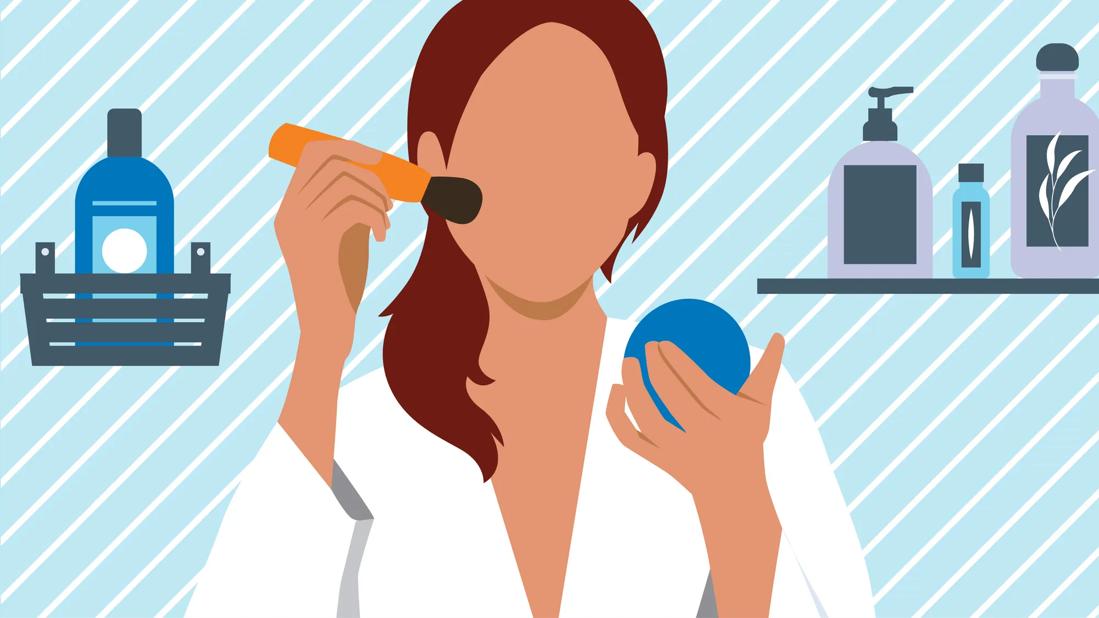The convenient option is good for touch-ups, but it shouldn’t replace your traditional sunscreen

Image content: This image is available to view online.
View image online (https://assets.clevelandclinic.org/transform/3477f2cf-2fa6-4758-b3a6-fe5a6414d05a/applying-powder-makeup-sunscreen-2176186467)
Person in bathroom, applying cosmetic to face with makeup brush
Whether the sun is shining bright or it’s a cloudy, overcast day, it’s always important to apply sunscreen.
Advertisement
Cleveland Clinic is a non-profit academic medical center. Advertising on our site helps support our mission. We do not endorse non-Cleveland Clinic products or services. Policy
And when it comes to using a powder sunscreen, it shouldn’t replace the traditional sunscreen (think lotions, sprays, sticks or gels) you apply each day. Though powder sunscreen isn’t as powerful at protecting your skin from harmful UV rays, it can be used as a touch-up throughout the day.
“Powder sunscreen is exactly what it sounds like,” says dermatologist Christine Poblete-Lopez, MD. “It’s sunscreen particles that are dispersed in a powder instead of being dispersed in a cream, lotion or spray.”
Powder sunscreen resembles face powder that’s used for setting makeup. Most powder sunscreens are mineral-based, with ingredients like titanium dioxide and zinc oxide, which physically block UV (ultraviolet) rays from your skin. The loose powder is typically contained in a cylinder container with a built-in brush. Generally, powder sunscreen comes in SPF (sun protection factor) 30, not much higher.
And while most powder sunscreens are designed for use on your face, they can be used anywhere on your body. A variety of powder sunscreens are available at stores or online, too.
It can be. Powder sunscreen should be used only as a touch-up throughout the day after your initial application of traditional sunscreen. (Reminder: It’s recommended that you apply at least an ounce of traditional sunscreen — or about the size of a shot glass — to your body and about a nickel-sized amount to your face and neck.)
Advertisement
While powder sunscreen doesn’t give you the same level of protection as traditional sunscreen, it does tout some benefits:
“If you have a sunscreen in your daily facial moisturizer and it doesn’t have a completely matte finish, applying a layer of powder sunscreen can help,” says Dr. Poblete-Lopez. “Also, if you have an oily complexion, you can use the powder sunscreen to help give that matte finish.”
But it’s not enough generally to give you adequate sun protection on its own, she stresses.
“You have to apply a pretty thick layer of the powder to actually get to the concentration necessary to give you adequate sun protection,” states Dr. Poblete-Lopez. “And powder sunscreen can easily rub off your skin.”
How often you’ll need to touch up or reapply your powder sunscreen depends on your activities. If you’re out in the sun, it’s recommended that you reapply sunscreen every two hours.
You’ll want to find a broad-spectrum powder sunscreen, which means it protects against both UVA and UVB rays. And aim for a product that has SPF powder of at least 30.
“For anyone who has sensitive skin, contact dermatitis, rosacea or eczema, there could be some ingredient like a fragrance or a preservative in a powder sunscreen that may not sit well with your skin,” warns Dr. Poblete-Lopez. “It’s important to read the ingredient list and choose a product accordingly.”
If you’re going to use powder sunscreen, she suggests applying it as your last layer. So, products like serums and moisturizers should be applied first.
“Start with lighter products first,” she continues. “Your powder sunscreen goes on as the last step.”
Overall, you want to stick with a traditional sunscreen in a lotion or cream form to get the maximum SPF protection. Using a powder sunscreen can be helpful for adding an extra layer of protection while you’re on the go.
“The most important thing to know about powder sunscreen is it’s probably not going to be used in sufficient quantities to give you the level of sun protection that your skin really needs,” Dr. Poblete-Lopez reiterates. “You can use it as a touch-up or as an additive product. But don’t rely on it.”
Advertisement

Sign up for our Health Essentials emails for expert guidance on nutrition, fitness, sleep, skin care and more.
Learn more about our editorial process.
Advertisement
Although it could be used as a moisturizer, this new trend is not recommended
It’s a great disinfectant for around your home, but not for your skin
Changes in texture, smell, color and performance are signs it’s time to throw the cosmetic item away
Strengthening your skin barrier, simple routines and minimizing products are ongoing, popular trends
Moisturizing, running a humidifier and adjusting your showers may help keep itchiness and irritation at bay
Glycolic acid benefits skin tone, texture and pigmentation by exfoliating dead skin
Some gentle soap and warm water go a long way when you’re washing these cosmetic tools regularly
New formulas are less drying and contain water-based and skin-loving ingredients
Although it could be used as a moisturizer, this new trend is not recommended
Communicating clear limits helps protect your time, energy and emotional well-being
High cholesterol can be genetic, but testing and treatment can lower your heart disease risk